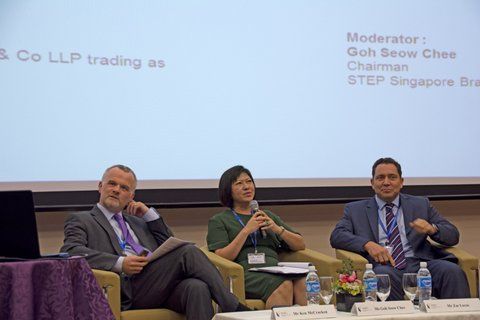
In May 2013, SMU and the global logistics company DHL jointly launched the DHL-SMU Green Transformation Lab (GTL). Hosted at SMU and funded by DHL, the lab aims to accelerate the evolution of sustainable logistics across the Asia-Pacific region. Building on the complementary skills and resources of SMU and DHL, GTL is tasked to create innovative solutions to help organisations transform their businesses towards sustainable green growth, and drive beneficial change in supply chains across the region through education, research and best practice development.
At GTL’s launch event, SMU President Professor Arnoud De Meyer noted: “We possess the knowledge and are able to provide a conducive environment for generating ideas and solutions that are vendor-neutral and interdisciplinary to help companies steer a green transformation of their businesses. SMU’s strength in information systems, operations and risk management, business strategies, law, economics and social sciences, allied to DHL’s global leadership in sustainable logistics, is a powerful combination.”
A New Logo
 |
Designed to mark its first anniversary, GTL’s new logo features a leaf with upturned veins as a symbolic representation of its goal to reverse the trend of global warming and depletion of resources to ensure a greener, more resource-efficient and sustainable future. |
Building Collaborative Capabilities
Within a year, GTL has made remarkable progress in pursuit of its goals. Drawing on the expertise of the School of Information Systems, School of Social Sciences, and Lee Kong Chian School of Business, SMU generates interdisciplinary solutions by bringing in technology know-how, innovative ideas and analytics capabilities to the partnership. For its part, DHL not only provides significant funding for two years, but also introduces real-world challenges associated with existing and future projects; domain expertise; thought leadership; as well as business and customer networks. Below is an outline of four of the many projects that have been successfully initiated by GTL over the last year:
1. Carbon Dashboard 2.0

Immediately after its launch, GTL embarked on a multidisciplinary project involving SMU faculty members and students from the School of Information Systems, together with DHL logistics experts, to overhaul DHL’s Carbon Dashboard – an online tool that measures carbon emissions along a manufacturer’s supply chain, and relates it to other supply chain management parameters. GTL not only gave the application a more user-friendly interface, but also added new analytical features to pinpoint graphically and exactly where fuel was used, and how emissions were generated.
2. Carbon Data Robot
The Carbon Data Robot is a step towards automating the cleansing and integration of data from the systems of various logistics service providers. This offers a common data model for consistent computation of carbon emissions, which could eventually be visualised for the entire supply chain on the Carbon Dashboard 2.0.
3. iSCCM: Integrated Supply Chain and Carbon Modelling
Both the Carbon Dashboard 2.0 and Carbon Data Robot are tools that support carbon footprint analysis of a supply chain after transportation has been completed. In addition to these, GTL designed an application that supports customers’ supply chain management planning. The iSCCM application allows companies to plan their supply chain networks visually, and evaluate key metrics such as costs, carbon emission, and the service level (time) of transporting raw materials, work-in-progress, final products or by-products in their networks. This tool also generates optional what-if scenarios and indicates the impact of each scenario based on the key metrics. This enables customers to design a more carbon-efficient supply chain, and to analyse the effect of making changes to their supply chain before implementation.

4. Shipping Container Load Optimisation
The fill rate of ocean freight containers is not always optimal, with capacity not being fully used. However, filling the containers adds very little to the amount of fuel used and carbon generated in their transportation. Therefore, optimising the packing density of ocean freight containers reduces the carbon footprint of each unit of a product shipped. To address this, GTL produced a planning tool that is capable of working out combinations of appropriate container size base on shipment volume and the possibility of consolidating shipments within the same source country.

5. Transforming Minds: Education and Outreach
Apart from applied research and development of IT applications, GTL is also actively engaged in its mission of raising awareness of greener and more sustainable operations across Asia-Pacific through education and outreach programmes. Such programmes included: (i) providing guest lectures for undergraduate and postgraduate courses at SMU; (ii) offering internships to SMU undergraduates; (iii) providing scholarships for students doing their Master’s Capstone projects; and (iv) giving PhD candidates the opportunity to work on real-world projects as research assistants. Currently, GTL provides a teaching case for an undergraduate course and real-world data to students in their course projects.
On the other hand, outreach programmes included: (i) supporting and hosting the bi-annual Green Freight Asia meeting, which welcomed 50 individuals from 31 organisations in November 2013; (ii) sponsoring and organising a Supply Chain Industry Workshop at the 10th Metaheuristics International Conference at SMU in August 2013; and (iii) appearing in a four-page feature in the November/December 2013 issue of Envision, a magazine produced by the Singapore National Environment Agency.
A Greener Future
Envisioning the future direction of the lab, GTL’s Director Stephan Schablinski notes that the growing scarcity of energy resources and the simultaneous increase in demand pose huge challenges for every industry. As an integral component of all other industries, logistics can help reduce their dependence on natural resources in order to keep them performing reliably and economically in the future. “Logistics should be viewed as part of the solution”, says Mr Schablinski.
Academic Director of GTL Tan Kar Way, who is also the Assistant Professor of Information Systems (Practice) at SMU’s School of Information Systems, elaborates: “Moving forward, GTL will continue to innovate, develop tools and build capabilities that address the sustainability challenges faced by businesses today. These challenges present great opportunities to link practice to education and research. With DHL’s domain expertise and SMU’s scholastic leadership and technology know-how, GTL looks forward to help more companies transform their businesses towards sustainable green growth.”
See More News
Want to see more of SMU Research?
Sign up for Research@SMU e-newslettter to know more about our research and research-related events!
If you would like to remove yourself from all our mailing list, please visit https://eservices.smu.edu.sg/internet/DNC/Default.aspx

